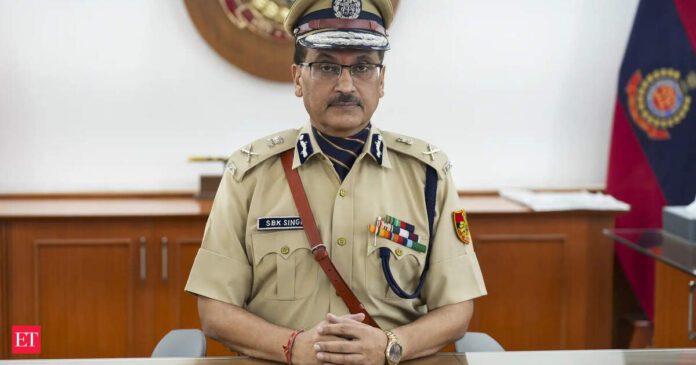He’s not just another name from the seniority list. Singh is a product of over three decades of policing across Delhi, Mizoram, Arunachal Pradesh, and even overseas. He steps into the role already serving as Director General of Home Guards, and now holds both responsibilities, as reported by PTI.
Singh is expected to serve until early 2026. At 59, he is the youngest officer of his batch still in service.
Known for his tech-driven approach, Singh had spent seven years in R&AW, working on several covert ops in the Northeast and a neighbouring country, sources told TOI’s Raj Shekhar Jha.
SBK Singh: Early life and academics
Born with a calm demeanour and a meticulous mind, Singh graduated with honours in Physics from Delhi’s St. Stephen’s College. He joined the Indian Police Service in 1986, later going on to earn an MBA in Human Resource Management from IGNOU.
This mix of science and human behaviour set the tone for a policing philosophy rooted in both logic and empathy.
Delhi’s man for all seasons
Singh’s Delhi innings is long and varied. He began as ACP in Karol Bagh and later held crucial posts as Additional DCP South, DCP North-East and DCP Central. He headed the Economic Offences Wing, took on cybercrime, land scams, and bank frauds, and worked closely with the RBI to develop anti-fraud mechanisms, including the OTP verification system now used across banking platforms.He served as Joint Commissioner (Crime) and Special Commissioner across Intelligence, Security, Law and Order, and Technology. During this time, he led some of the city’s most delicate and high-stakes probes, including the Uphaar cinema fire, the Ponty Chadha murder case, and the Hansie Cronje match-fixing scandal, as reported by TOI.
His leadership was also central to the Safe City Project and Delhi’s Intelligent Traffic Monitoring System. As Special CP (Technology & Project Implementation), Singh helped design the ‘Lost Report’ app, a QR-based police feedback system, and inked a deal with IIT Delhi for the Digital Trucking Radio System.
Security at the highest level
Two assignments underline Singh’s capabilities when the stakes are at their highest.
In 2015, he oversaw security arrangements during US President Barack Obama’s visit for Republic Day celebrations. That same year, he managed the security logistics for the Indo-Africa Forum Summit, which brought 54 heads of state and dignitaries to Delhi.
These were operations with zero room for error. And they ran smoothly.
Reformer in the NE
As DGP of Mizoram and later Arunachal Pradesh, Singh drove reforms that had both practical and symbolic impact.
In Mizoram, he set up the state’s first all-women police station and a tourist police unit, and launched the Mizoram Safety App. He introduced e-challaning and brought the force online, while also working to control drug smuggling through the Myanmar border.
In Arunachal Pradesh, he launched the Arunachal Suraksha app, introduced an online complaint portal, and established official social media handles to make the force more accessible to the public. More than 1,500 constables were promoted to honorary head constables during his tenure—a gesture that sent a clear message on personnel welfare.
RAW, Kosovo, and quiet diplomacy
Singh’s service record extends beyond borders.
He spent over seven years in the Cabinet Secretariat (R&AW), with postings in India and abroad. He also served with distinction in the United Nations Peacekeeping Mission in Kosovo, earning the UN Peacekeeping Medal. These years shaped a discreet but deeply strategic side of his approach to law enforcement.
SBK Singh isn’t just a police officer. He’s a thinker. He writes a blog titled ‘Spiritual Policeman’, where he reflects on the ethics and psychology of law enforcement, often blending spirituality with leadership lessons.
His wife, Sushi Singh, is active in the Police Welfare Society, and the couple’s two daughters now live in the US. Together, they represent a quiet but thoughtful presence in Delhi’s police circles.
As DG of Home Guards, Singh introduced a Rs 50 lakh accidental death cover for volunteers and rolled out RFID-based recruitment tests to make the system more transparent and merit-based.
A career that speaks for itself
Singh has been awarded the President’s Police Medal for Distinguished Service, the Police Medal for Meritorious Service, and a Silver Medal for National e-Governance.
These aren’t just tokens of time served. They’re recognition of a career built on substance, on getting things done, improving systems, and thinking a few steps ahead.
SBK Singh takes charge of Delhi Police at a time when the city continues to grow more complex, more diverse, and more challenging to police. But Singh isn’t walking in blind. He’s worked the lanes and led from headquarters. He knows the city. And now, he leads it.
He’s not flashy. He doesn’t make grand speeches. But behind the quiet presence is a career of action, reform, and results. And Delhi, right now, could use exactly that.
(With inputs from TOI, PTI)

